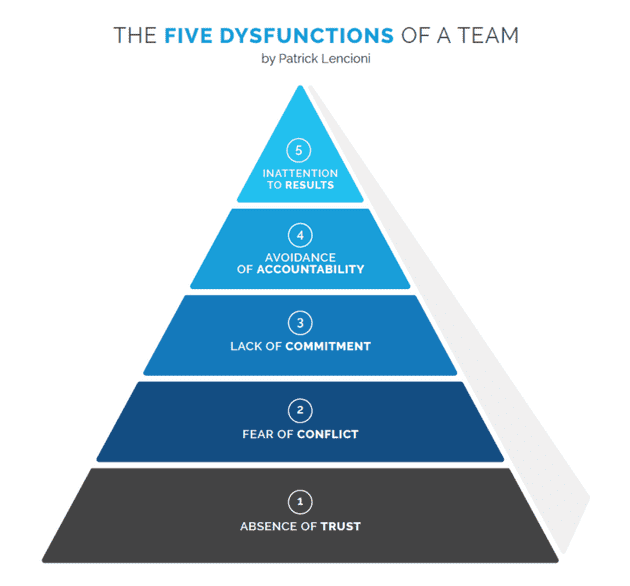Remember, in a team, everything starts with trust. “People don’t care about how much you know until they know how much you care.” - President Roosevelt.
The trusting relationship between managers and their direct reports is foundational for any other changes to occur. As Patrick Lencioni pointed out in his book Five Dysfunctions of a Team, the trust layer is at the bottom of the pyramid. Without it, the whole thing is built on shaky ground and will likely collapse under pressure.
As managers, according to Andy Grove, our main responsibilities and duties to our team are to train and to motivate. It will always come down to a combination of the two. From that perspective, each member of our team of engineers falls into one of the 4 following categories:
- Untrained and unmotivated.
- Untrained and motivated.
- Trained and unmotivated.
- Trained and motivated.
For Junior Engineers
For junior engineers, with a few years of experience in them, the most likely help they will need is to become task-competent. One effective way to help is to provide training. We can do the training ourselves if we are task-competent on the subject, or we can get the senior engineers to do it. Training is essential to getting the junior engineers up-to-speed and productive.
With the assumption of a junior engineer requiring training, we also need to determine whether he is motivated to perform. If he is not motivated, the first step would be to find out why there is no motivation. If we have an untrained and unmotivated junior engineer, something is very wrong here. Is something bothering him? Is it the team? Is it the environment? Or did we make a bad hire? We must get to the bottom of it.
For Senior Engineers
For senior engineers, with more experience and knowledge, these folks will most likely need more direction than instructions. Instead of training, we would do well to find ways to motivate them. People have different motivations, so we must build a good working relationship with these folks first to understand what is important to them and how to light the fire back in them.
With the assumption of a senior engineer being well trained and task-competent, we again need to determine whether she is motivated. If she is motivated, hey, congrats, we’ve got ourselves a star. If not, lean on the trusting relationship you have built to find out what’s bothering her. Is she bored? Does she want more interesting challenges? Does she need more directions? Does she feel stuck career-wise? Having answers to these questions can help us find the best way to motivate our senior engineers.
Summary
There are differences in mentoring and coaching engineers with varying levels of skills, experience, and knowledge. To be an effective manager, we need to determine whether training or motivation is needed before we offer help. Junior engineers are often untrained but motivated, so we can provide training. Senior engineers are experienced and trained, so our focus should be on increasing motivation. All these are possible through the foundation built with the trusting relationship we have with the team.
